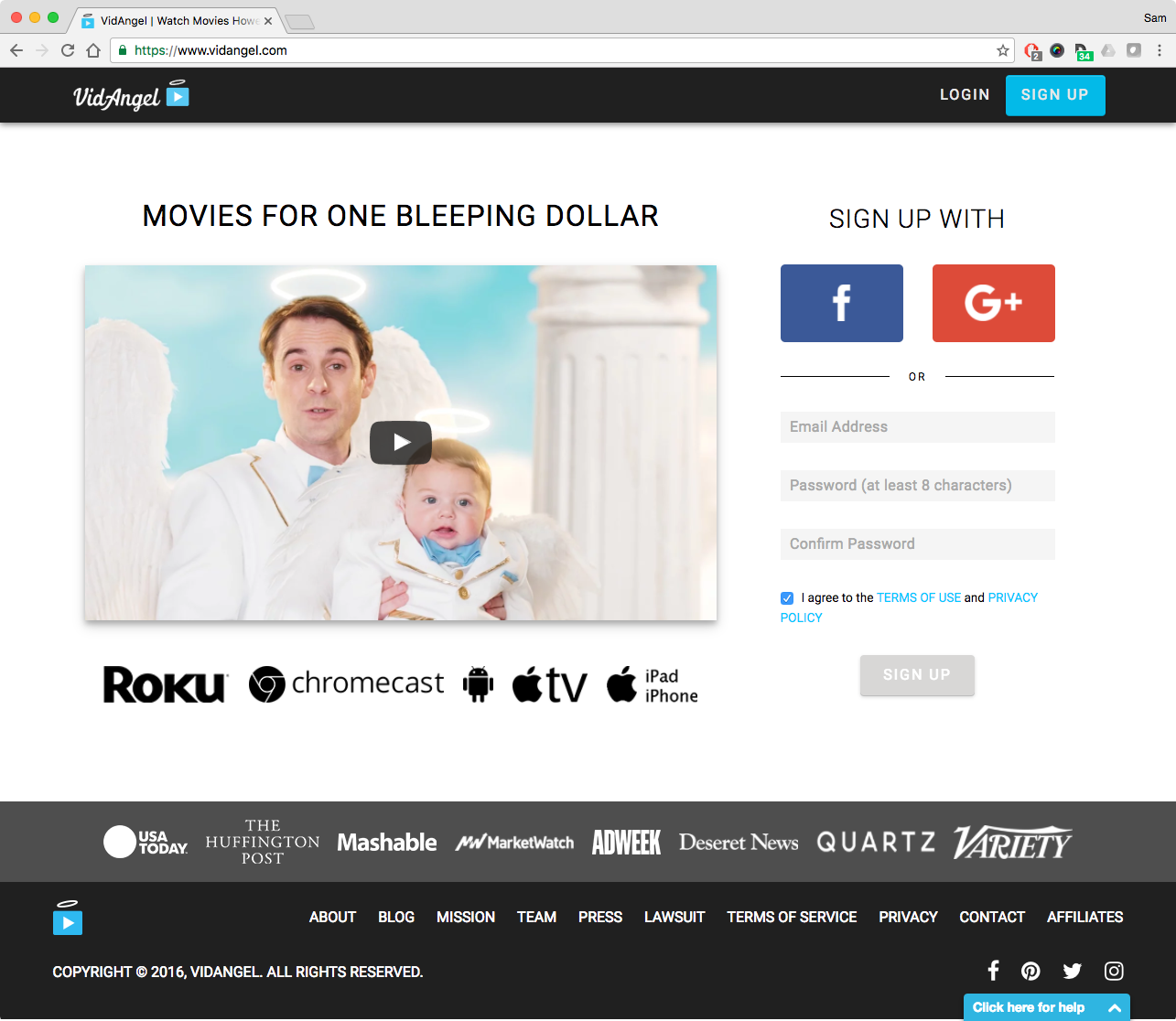About 17 of my friends are all spun up about a new controversy brewing about a service called VidAngel, a(nother) Utah-based video filtering company that promises to help you enjoy any film you want out Hollywood without offending any delicate sensibilities. Their angle on the well-worn debacle? They bring their flavor of filtering into the realm of streaming video, something not yet done by any other company. Because there is no technically feasible approach to doing this without violating copyright, they are, in fact, getting sued by a consortium of content owners for their methods — and here’s my take on it.
Before I begin, though, I will say that I’m not going to attempt to take on the morality of this subject. I don’t really care if you like or dislike filtering services or if you think they should exist or shouldn’t. Nor do I recommend VidAngel or not recommend it.** I intend to really just dissect the legality of the situation, strictly from an uninformed, lay-person-playing-lawyer perspective. I could be right, I could be wrong, and this is a blog so it’s just my opinion any way. You are entitled to yours as well, and if it’s different than mine — congratulations for rubbing two brain cells together to make fire, young caveperson.
Disclaimer in hand, is what VidAngel doing illegal?
They say no. (If you want their opinion on what they are doing, you can read this stuff, but you don’t have to if you don’t want to.)
To sum up their claim, they claim their are providing a service to their customers whereby they acquire a physical copy of a movie from a retail source at retail prices on behalf of you, their customer. They then wave a magical technology wand and open a wormhole through the Internet from their datacenters into your household, where they play you that movie with their filters in place. Since you “own” it, you can keep the movie forever (they charged you $20 for it) in some digital locker (with the correlating analog version in cold storage somewhere), or you can choose to sell it back to them and get some credit on your account, which you can then use to buy other filtered movies from them. (What they really intend for you to do.)
Seems legitimate, no? Here’s why it’s not:
When you buy a video disc or VHS tape or any other copyrighted film from a retail store, you are actually NOT buying the film itself. You are buying a license to view that film a specific setting. This is made crystal clear in those ominous FBI warnings that are displayed at the beginning of all home videos. The work of art itself — the content — actually never belongs to you. Yes, you did buy and you do own a piece of physical media that was made to transmit the film, but what you purchased for $19.95 was the license to view the video in the comfort and privacy of your own home.
This is the fundamental claim that owners of copyrighted material have over the art they sell; it is never “yours” — it’s always theirs — and they are just giving you a temporary license to watch it. This is why it’s technically illegal to show a home movie in a public venue, like a park or baseball stadium, even when you have legitimately purchased a copy — it was not licensed for public performance. Now, jack-booted thugs will not come crashing down your fence if you choose to have a backyard showing of The Sandlot to kick of little league season, but if your local little league chooses to show it before the first game of the season, and sells tickets and refreshments, you’d better believe their going to have a Disney lawyer sending them love-letters in due course.
And what about modifying a legally purchased copy of a movie? That is also illegal — though illegal is kind of a strong word. It’s a violation of the owner’s copyright. They made a thing, which they then licensed to you to show your family in your home. They did not give you, as part of that license, cart blanche to modify the original source material they sold you. Pulling out the VHS tape, razor blading out a few minutes, and scotch taping it together is — technically — illegal — because you’ve altered the material and it can never be viewed again the way that it was licensed to you and sold to you. Also, if you ever re-sell your license (copy) of the movie, it is forever altered and now they are N+1 divergent copies of the original source material on the market. (You Mormons out there should now go ponder on the moral side of the question given what I’ve said here and our understanding of the ‘evil’ people who altered sacred texts over the course of centuries. They were just “filtered copies” they made for their own use, right?)
Now let’s apply our new understanding of licensed home viewing of films to the VidAngel service.
What VidAngel says they are doing and what they are actually doing are not the same thing. If every time an order came in, they rushed down to WalMart, purchased the DVD you wanted off the shelf, stuck it in a magical internet-connected DVD player that transmitted the signal via closed-loop broadcast to your computer in your home, with some carbon-based life form sitting there with a remote skipping and muting parts of the movie you told them you might not like — then perhaps it would be legitimate. But that’s not what they are doing, and their “model” is super-flawed. (P.S. they know it too, which is why in their defense they call out that this was the 4th thing they tried when they were looking for a way to provide filtered, streaming media)
What they are really doing is pre-buying a BUNCH of copies of the same movie to build an inventory of movies that can be “sold” to a customer at one time. Then they illegally decrypt one copy of the movie off of the disc. Then they edit it for content and create special, digitized copy of this edited version and store it in their cloud. (Presumably, they are also creating multiple copies with different variations of things cut out of them, giving their customer maximum flexibility in what they are willing to see and hear from a movie.) Then, on demand from a customer, they stream you this illegally created copy of the movie you requested.
So there are a few ways this is illegal:
- They decrypt the source material. Breaking encryption is illegal. (unless you are the NSA or CIA) Sorry, charlie. Slam dunk on that one alone.
- They alter the work and store altered copies of that copyrighted work for mass distribution. This breaks the fundamental rule about not altering the source content you paid a license to view in your home. Yes, you have the right to start, stop, mute, rewind, fast forward, or whatever you want in the comfort of your own home, but that license you purchased did not give you the right to permanently alter the content of the performance, nor does this company have a right to do it for you. ***
- They do not properly transfer the license to their customer in an established, conventional way. Their claim is that they act as an intermediary, picking up a DVD at the store for you and then streaming it to you at your convenience. However, they do not transfer the purchased, retail license to view the content via any regular, expected, or established means of retail transfer. In real life, this looks like garage sales and flea markets and $5 DVD bins at Walmart. One purchases and transmits the original source material between parties in the original way it was purchased, not an impermanent, copied, transiently transmitted set of bits that represent the content that was on the DVD/media purchased. You don’t buy a DVD and then copy it to a VHS cassette, sell the VHS cassette and burn the DVD and claim that you transferred the license. Nope, you created an illegal copy, dude. Game over.
I don’t think they have a leg to stand on in this lawsuit, and I expect it to not drag on for too long.
And now I will say something they should start looking at… automated, cloud-connected eye covers and earplugs. You can program the device to the time code of whatever movie you are watching and when something objectionable happens, it can clamp down on your head like the Iron Maiden so you don’t hear or see anything you don’t want to. It will be all the rage, and that is a device that Hollywood can’t touch.
** What about Clearplay? So far, in my estimation, Clearplay is actually the only legitimate technology for filtering movies. I won’t attempt to explain the details here, but if you want a legal solution that will stick around, my money is on that approach.
*** Ok, so since I’ve never used it, I’m not quite sure on this one. I’m also imagining they are storing and streaming complete copies of the movies and allowing a specially created video player (in the user’s computer or other device) to automatically mute or skip what they have chosen to filter based on a ‘script’ of time codes that do certain actions at certain times. If that’s the case, then #2 doesn’t apply anymore. But if they are doing #2 it’s definitely more heinous than #1 and #3. If I were building a service like this, doing #2 is really a bad idea from both a legal and operational, so maybe they don’t actually do it. Again — I dont’ know anything, just a bunch of blather from an uninformed lay person. If you know more, feel free to correct the record in the comments.


